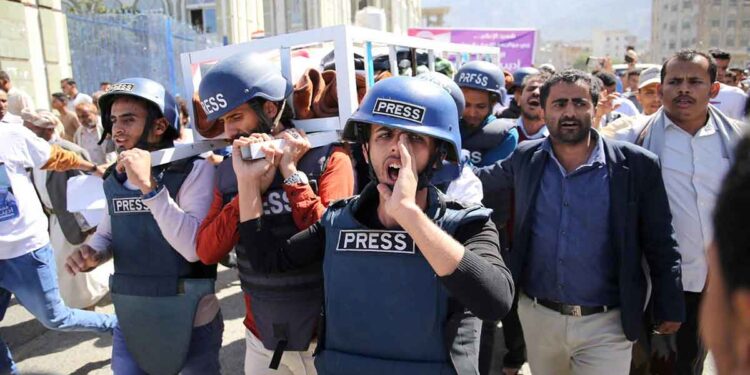In Yemen violations against media, professionals continue, against the backdrop of a war that has raged for nearly seven years.
The Yemeni Journalists Syndicate has documented 36 cases of violations of media freedoms over the past six months.
In its biannual report on the state of media freedom in the country, the Syndicate states that “36 violations were recorded between the start of this year until the end of June, affecting journalists, photographers, and media groups.”
The report documents 12 instances of kidnapping, detention, prosecution, and harassment, 4 cases of threats and incitement against journalists, and 5 cases of physical attacks on journalists, press headquarters, and other private property.
The report also documented 18 cases of groups prohibiting coverage and confiscating newspapers, and 7 cases of journalists being trialled and prosecuted.
The report claims that Houthi forces committed 20 of the total violations, or 55%, whilst the government of Abdrabbuh Mansur Hadi in its different forms committed 10, representing 28% of the total. The UAE-backed Southern Transitional Council committed 6 of those violations, representing 17%.
As the report points out, “the 9 journalists kidnapped by the Houthi group are: Waheed Al-Sufi, Abdul Khaliq Omran, Tawfiq Al-Mansoori, Akram Al-Walidi, Harith Hamid, Nabil Al-Sadawi, Muhammad Abdo Al-Salahi, Walid Al-Matari, and Muhammad Ali Al-Junaid. Four of them were issued unfair death sentences.”
The report underlined that the situation is a result of the conflict’s various parties’ shared policy of restricting journalists’ ability to work, and of involving journalists in that conflict and treating them as enemies. The report called for respect for the freedom of opinion and expression, media pluralism, and citizens’ right to obtain information.
The Syndicate has demanded the release of all kidnapped journalists, the end of death sentences against them, and an end to journalists’ families’ suffering, including by compensation. The union also insisted that all violations against press freedoms must not be subject to a statute of limitations and that those responsible must be held accountable for their crimes.
Since starting seven years ago, the war in Yemen has killed 233,000 people. 80% of the population – approximately 30 million people – is now dependent on aid to survive, in the worst humanitarian crisis in the world, according to the United Nations.
The conflict is complicated by the presence of various regional interests. Since March 2015, a coalition led by neighboring Saudi Arabia has carried out military operations in support of the government, in opposition to the Iran-backed Houthis, who control several governorates and the capital, Sanaa.






























